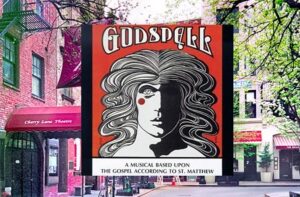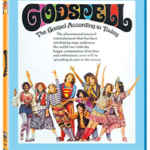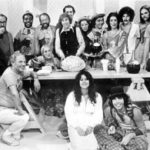 by Carol de Giere
by Carol de Giere
When the new musical Godspell opened officially on May 17, 1971, no one knew what might happen. Audiences had been loving it during previews, but the critics who would release their reports later that night might deter new audiences from attending. Would the adventurous show survive? From the standpoint of the cast and creators, the risk was worth taking, even though it was unnerving.
Finishing the Show
In early May, the ten-member original Godspell cast continued to craft and rehearse their show, realizing there was still much to do: songs to practice from the new Stephen Schwartz score, dances to invent, and creative bits to finalize as they switched from improvisation to a repeatable, structured musical. Twenty-three-year-old Schwartz had taken over much of the rehearsal time for song performance and staging.
Their official director John-Michael Tebelak guided some of the proceedings but didn’t dictate what had to be done. As a case in point, Tebelak had explained that the dances should be goofy rather than slick—with his mantra being “keep it childlike.” Since the actors still needed steps to use during the songs, fellow performer Joanne Jonas and music director Stephen Reinhardt, who were both trained dancers, gladly helped choreograph some specific moves.
Tebelak had conceived the show only months earlier. The first version had opened at Carnegie Mellon University’s Studio Theatre as part of his master’s degree project, but with lyrics mostly from an old Episcopal hymnal sung to a pop/rock score by one of Tebelak’s friends. The show then transferred for a short production at the experimental theatre, Café La MaMa, in Manhattan’s East Village, where it was taken on by commercial producers for a run at the Cherry Lane Theatre, a 99-seat house tucked into a quiet corner of Greenwich Village.
Producers Joseph Beruh and Edgar Lansbury had previously been brought into Stephen Schwartz’s agent’s office to hear songs from his work-in-progress, Pippin. They remembered him when they needed a professionally created score for Godspell. Because the new version was to begin rehearsals in mid-April, Schwartz had to finish an entire score in five weeks—which he managed to do except for the addition of “Learn Your Lessons Well” written and added about a week before the opening.
One major issue discovered in the last weeks was that the show was running too long. Peggy Gordon remembers loving their efforts on the Parable of Talents, but the group realized it must be cut. Meanwhile, Gilmer McCormick struggled to memorize “Learn Your Lessons Well,” the cast rehearsed in their costumes, and the theater was made ready for an audience.
Schwartz often describes his experience of those days by referencing the 1939 movie, Babes in Arms, with Judy Garland, Mickie Rooney, and a cast of their young peers, who put on their own show. The kids-putting-on-a-show-in-a-barn feeling was something he loved and would always miss in his future musical collaborations.
There’s another experience that stands out in his mind, and he describes it in his Foreword to the book The Godspell Experience: Inside a Transformative Musical. “Right before previews began, since anxiety was now mounting a bit, one of the producers, Joe Beruh, took me out to dinner, to help calm me down. I will never forget what he said to me that night. I can still see where we were sitting and hear his voice. He told me that, having seen what we had in rehearsal, he was confident that we were going to be all right with the show. But then he spoke more quietly and leaned into me a little, and said, ‘But if you really do your jobs now during previews, if you really get this together, you’re not going to believe what’s going to happen.’ Those are probably the most prescient words I’ve ever heard from a producer.”
Opening Night
For the opening itself, actors in their tiny dressing rooms prepared for their appearance. Joanne Jonas recalls, “I heard ‘curtains!’ and I remember goosebumps going all up and down my arms. We were in gray sweatshirts and we were going out to pull down the Par lights and do the ‘Prologue.’ I remember looking out. The house was dark except for a few exit lights – and I could see it was totally full. At that point the nerves just left, and I went ‘It’s now, and it’s going to happen, and it’s really great.’ I kind of heard that inside.” The show began, it proceeded mostly as expected, and then they reached the ending during which the cast carries actor Stephen Nathan playing Jesus on their shoulders down the aisle to the back. Jonas continues, “I remember carrying him out at the very end and hearing ‘This is the beginning’ kind of thing. It was a profound moment. Then everyone was standing up and shouting. This small room was on fire.”
Although New York Times critic Clive Barnes found some things to like, he closed his remarks by saying, “…there may well be those who will find freshness and originality here where I could discover only a naïve but fey frivolity.” But with help from the publicists, producers, audiences, and some glowing reviews, Godspell went on to become an international hit and a still-beloved musical fifty years later.
Find many more details about the show’s development, songs, and meaning in The Godspell Experience: Inside a Transformative Musical.






